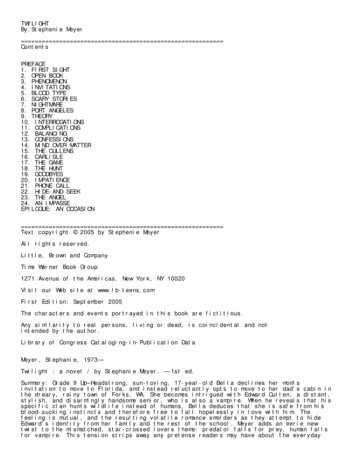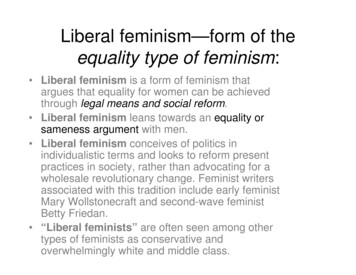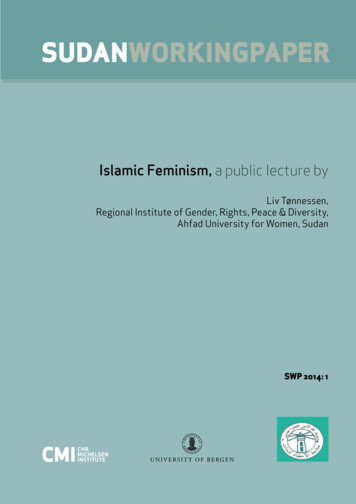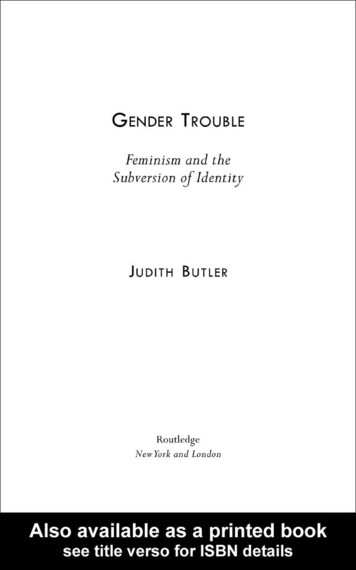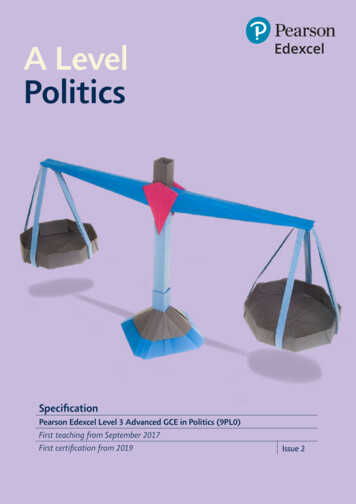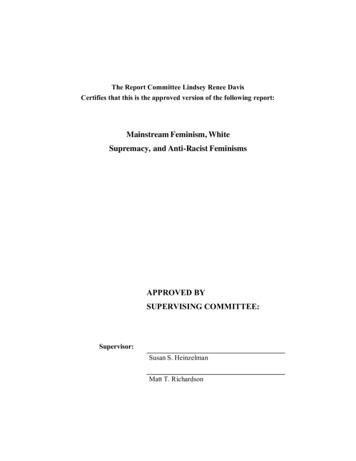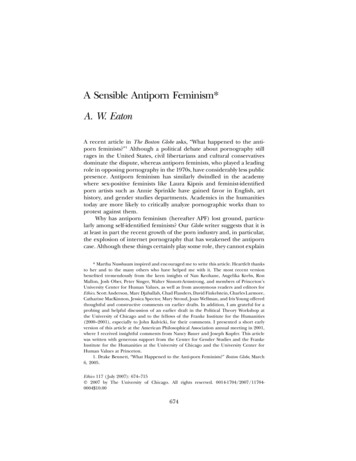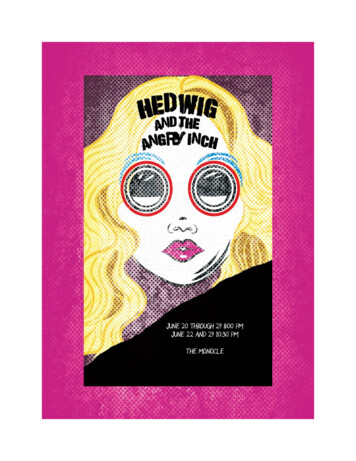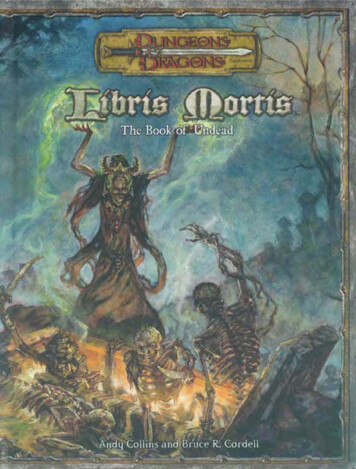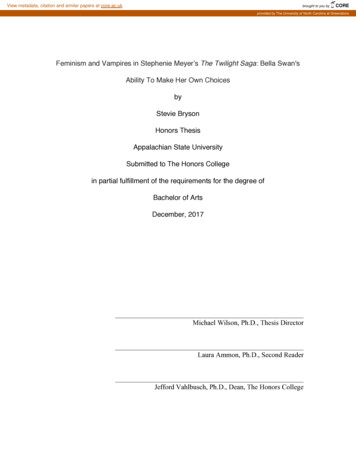
Transcription
View metadata, citation and similar papers at core.ac.ukbrought to you byCOREprovided by The University of North Carolina at GreensboroFeminism and Vampires in Stephenie Meyer’s The Twilight Saga: Bella Swan'sAbility To Make Her Own ChoicesbyStevie BrysonHonors ThesisAppalachian State UniversitySubmitted to The Honors Collegein partial fulfillment of the requirements for the degree ofBachelor of ArtsDecember, 2017Michael Wilson, Ph.D., Thesis DirectorLaura Ammon, Ph.D., Second ReaderJefford Vahlbusch, Ph.D., Dean, The Honors College
Abstract:Stephenie Meyer argues that Bella Swan is a feminist character because“the foundation of feminism is this: being able to choose. The core of antifeminism is, conversely, telling a woman she can’t do something solely becauseshe’s a woman” (Wilson 207). However, using this definition of feminism, BellaSwan still is not a feminist character because she might not be making thesechoices of her own free will due to her controlling, abusive, vampire boyfriendwith psychic abilities. She does not actually become a feminist character underthis definition until she herself becomes a vampire and gets on a level footingwith Edward in terms of supernatural abilities.
As feminism enters the mainstream, more and more people try to arguethat the works that they have created are in some way “feminist works.”Stephenie Meyer, the author of The Twilight Saga, is no exception; she arguesthat her book series and the main character, Bella Swan, are feminist. In her ownwords “the foundation of feminism is this: being able to choose. The core of antifeminism is, conversely, telling a woman she can’t do something solely becauseshe’s a woman” (Wilson 207). Her claim that Bella is a feminist character isbased entirely on a faulty and oversimplified version of feminism, but evenignoring this, her argument still does not hold water. If, as Meyer says, feminismis the ability of a woman to make her own choices and to not be told that shecannot do something because she is a woman, Bella Swan still is not a feministcharacter because not only is she constantly being told what to do, she is alsopotentially enthralled by a vampire with explicit psychic abilities and a habit ofcontrol and manipulation.Feminism in the United States today has a multitude of definitions, as it isa complex and ever changing ideology. Due to this complexity, it can be hard foreven those who consider themselves feminist to define it. Jaime Loke articulatesa rather important point about feminism: that the mainstream U.S. media has along history of telling the story of one group of women who all agree on a simpleand easy definition of feminism as if it were a singular issue (Loke 123).However, there are many people who make claims such as these without everreally defining what feminism is or what it specifically means to them. The
blurriness of the definition makes cultural conceptions of feminism rather variedand undefined, leaving open the room for different and conflicting ideas aboutwhat feminism is to arise, such as Meyer’s definition that it is purely about awoman being allowed to make her own choices, regardless of what they are. Forthe purpose of this analysis, I will be using Meyer’s own definition of feminism.The question of whether or not Bella Swan is a feminist character whogenerally makes her own decisions would matter substantially less if The TwilightSaga were not such a cultural phenomenon which was incredibly popular withwomen, both young and old. Overall, Meyer’s books have sold more thanseventy million copies (Barnes), breaking numerous sales records across theglobe (Alexander). According to the children’s books buying manager at Britishbookstore Waterstone, Sarah Clark: “Popular doesn’t even begin to describe itThe Twilight Saga is a phenomenon in its own right and like Harry Potter it hasgenerated a global sensation that crosses several media” (Alexander). Itsinfluence can be felt across the genre, having created a subset of vampire youngadult romance that has quickly become clichéd due to the vast number of bookslike it that have been published just in the last decade. The Twilight Saga, as oneof the fastest selling and most popular books of the twenty-first century,influenced the lives and thoughts of so many readers. The claim that Bella Swanis a feminist character gives these readers a false perception of what feminism isand normalizes the experiences she went through with a controlling, manipulative
partner, making it seem as if her experiences are the ideal relationship modelwith an over-romanticized view of Edward’s less savory personality traits.The Twilight Saga tells the story of Bella Swan, a teenager who moves inwith her father in an unfamiliar town full of strange creatures that all seem to beinterested in her. This move highlights the self-sacrificial behavior that plaguesBella throughout the series, as she does so to make her mother’s life easier eventhough she does not want to live in Forks, Washington. It is not long before Bellais surrounded by vampires and werewolves; she starts a romantic relationshipwith Edward Cullen, the only single vampire in Forks, and later befriends JacobBlack, a werewolf with a massive crush on her. Her relationship with Edwardleads to run-ins with several groups of dangerous vampires, putting her life in hishands multiple times over the course of the series. After about two year’s worthof plot over the course of the four novels where Bella is repeatedly endangeredby her proximity to these vampires and werewolves, Bella reluctantly agrees tomarry Edward and becomes life-threateningly pregnant with his half-vampirebaby. At the end of the series, Bella Swan has become Bella Cullen, a vampirewho is no longer in danger from either her relationship with Edward Cullen or thevariety of other vampires who had wanted her dead.I. Control and Abuse in The Twilight SagaVampirism aside, Bella Swan’s relationship with Edward Cullen has beencritiqued since the release of the book as abusive and controlling by book
reviewers, casual readers, and scholars. Bella’s relationship with Edward has tobe on his terms from the very beginning. His avoidance of Bella for the firstseveral weeks of knowing her eventually breaks down into a reluctant,mysterious friendship where he hardly gives her any actual answers to herquestions. When she asks him why he is so suddenly fine with being her friend,he claims “‘It would be more prudent for you to not be my friend But I’m tiredof trying to stay away from you’” (Twilight 84). She had been interested in gettingto know him and his secrets for weeks at this point, but only when Edwarddecides it is time for them to be friends do they actually start to interact. As heleaves her to figure out what his cryptic words mean, he continues to warn herabout staying away from him, as if she has actually has a choice in the matternow that he has decided they are going to be friends (Twilight 84). Once Edwarddecides that he is going to be a part of Bella’s life, he takes it to the extreme.After barely interacting with her outside of saving her life one time, he follows herout of town while she is shopping with her friends because he does not believeshe can take care of herself (Twilight 174). His behavior is that of a stalker andeasily a criminal offense, but because he actually does save her life in thisinstance, the consequences of his stalking are disregarded.Edward’s aggression and controlling behavior are hidden behind a thin veilof what he claims to be “self-restraint,”- where he continuously promises that hewill not hurt Bella by feeding on her as a vampire because he would rather not doso. However, the desire to hurt her is always there and he admits so himself.
Because he is a vampire who wants to drink her blood and kill her, the desire tohurt her is not something he has much control over. He is actually moredangerous to Bella than he is to other humans because something about the wayshe smells is particularly enticing to him as a vampire; Edward warns her that“‘It’s not only your company I crave! Never forget that I am more dangerous toyou than I am to anyone else’” (Twilight 266). Edward willingly admits that she isin great danger just by being around him and he is not sure that he can controlhimself, but he puts her in danger anyway because he desires her company. Heclaims to give her the choice, telling her that she can leave if she wants to, butbecause she never makes that choice, there is no way to know if he really wouldjust let her go after she knows so much about him and his family. He had alreadyargued with his family over whether or not it would be more prudent to just kill herand be done with the whole situation (Twilight 272).After he’s forced to drink Bella’s blood to save her life by sucking anothervampire’s venom out of her arm, he is boastful about his ability to stop and notactually murder her: “‘It was impossible to stop,’ he whispered. ‘Impossible. But Idid.’ He looked up finally with a half smile. ‘I must love you’” (Twilight 460). Hefully admits that if he did not actually care about her in some way, he would havekilled her because the desire was too strong to stop himself. Bella carefully andrepeatedly rationalizes her feelings about his near promises of violence, comingto the conclusion that because he has not actually hurt her or anyone around her,he must not be dangerous: “’He said you didn’t hunt people. He said your family
wasn’t supposed to be dangerous because you only hunted animals’” (Twilight186). Edward even objects to the assumption that he is safe to be around,seeming “deeply skeptical” when he hears that anyone who knew what he wascalled him “not dangerous” because he believes that even though he makes thechoice not to eat humans, that does not mean that humans are not stillendangered by being around him (Twilight 186).The story of a female character endangered by a seductive monster is nota new one. Margaret Kramar compares the relationship between Edward andBella to the story of “Little Red Riding Hood” in her essay “The Wolf in theWoods.” She claims that the difference between the young girl in the folktale andBella Swan is that “the teenaged Bella knows that she should not be talking to awolf” (Kramar 19). Bella knows that Edward is dangerous and that any sane,rational person would make the choice to stay away from danger. However, Bellaseems to lack the rational ability to make the logical choice to stay away fromEdward. Even when she tries to stay away, Edward forces her to go with him.After she faints in a biology class and wants to take herself home alone, Edwardgrabs her and drags her to his car against her will (Twilight 103). “‘I’ll just dragyou back,’ he threatened” (Twilight 103) when she even begins to look like she isconsidering making a run for it back to her own truck.This sort of physical dominance over her is rather common in the books,but in addition to Edward’s near constant manhandling of her, Bella’s relationshipwith Edward is emotionally toxic, as well. His presence leads her to lie to
everyone in her life, alienate most of her friends, and focus all of her time on theirrelationship. At one early point in their romance, she lies about being withEdward to her father and friends so that no one will suspect him if he happens tomurder her that day:“You said it might cause trouble for you us being together publicly,” Ireminded him.“So you’re worried about the trouble it might cause me – if you don’t comehome?” His voice was still angry, and bitingly sarcastic.I nodded, keeping my eyes on the road. (Twilight 255)She has only known him for a few months, but she already places his reputationover her own safety. Edward also refuses to give her certain pieces ofinformation unless she has to know them, which places her in a position whereshe relies on him constantly for answers. She has to get her answers from otherpeople; Jacob has to tell her that Edward and his family are vampires and Alicehas to tell her how people become vampires (Twilight 124, 413).Although Edward’s violence towards Bella seems more controlling thanpunitive at this point, his pattern of controlling behaviors matches well with reallife examples noted in Alisa Velonis’s study of violence in controllingrelationships, “‘He Never Did Anything You’d Typically Think of as Abuse’:Experiences With Violence in Controlling and Non-controlling Relationships in aNon-Agency Sample of Women.” In this study, Velonis sent email surveys towomen using a list serve on an academic medical campus, rather than
specifically women who had reported domestic violence, about the manipulationand control they experienced within relationships that led to physical violence:“Despite not feeling frightened for their personal safety on an ongoing basis, all ofthe woman with controlling partners described how their partners reframedtheir perceptions of reality, isolated them from others, and occasionallydominated them physically” (Velonis 1046). Edward shows a similar pattern ofcontrol over Bella. His presence in her life forced her to isolate herself from herfriends and family for his safety, even though it would have been safer for her tohave others around, especially with the constant threat that he would “fall off thewagon” and murder her (Twilight 269). His supernatural levels of strengthallowed him to overpower her physically almost without trying and the mere factof his existence forced her to rethink how she perceived the world around her.Their relationship matches with Velonis’s definitions of domestic abuse incontrolling partners almost too well.As noted earlier, Edward’s control does eventually manifest in his use ofviolence to assert physical dominance over Bella on numerous occasions. As avampire, Edward is substantially stronger than Bella, meaning that when hechooses to exercise physical dominance over her, she has absolutely no chanceto get away from him. There are a number of times where she tries to walk awayfrom a conversation and he physically grabs her to hold her there: “I tried to turnaway from him again, but he held me fast” (Twilight 365). As Velonis notes in herstudy that “One of the most common scenarios [in controlling relationships]
involved pushing or hitting a partner when he blocked an exit or grabbed theirarm to prevent them from leaving” (Velonis 1045). Like those men and women,Edward’s control over her in these circumstances is entirely physical, onlyemphasizing and physicalizing the emotional and mental control that he normallyholds over her.Edward’s physical control over her did not stop at physically preventingher from walking away from him during tense conversations. Other cases ofphysical control include an attempt to kidnap her and force her to go with him toanother state for her own protection:"We have to get you away from here — far away — now." He didn't lookback, his eyes on the road. The speedometer read a hundred and fivemiles an hour."Turn around! You have to take me home!" I shouted. I struggled with thestupid harness, tearing at the straps."Emmett," Edward said grimly.And Emmett secured my hands in his steely grasp."No! Edward! No, you can't do this.""I have to, Bella, now please be quiet.""I won't! You have to take me back — Charlie will call the FBI! They'll beall over your family — Carlisle and Esme! They'll have to leave, to hideforever!""Calm down, Bella." His voice was cold. (Twilight 381)
Edward does not care what Bella wants in this scenario; he has to be talkeddown from just dragging her out of the state against her will by his vampiresiblings, supposedly for her own protection. Only when Bella shares a slightlywatered down version of his own plan that Alice and Emmett agree is a saneroption does Edward calm down enough to ask his brother to let her go, after hehad requested that Emmett physically restrain her.When Bella becomes pregnant with a half-vampire child that threatens tokill her, Edward skips directly over persuasion to get his way and goes right forphysical violence. At this point, Edward attempted to force her into an abortionshe did not want. When Jacob, another male character with little respect forBella’s personal choice in the matter, asks why they did not “Hold her down andknock her out with drugs” (Breaking Dawn 178) because they were physicallycapable of doing so, Edwards admits that he had originally wanted to do exactlythat. The only thing that stopped him was his sister Rosalie’s intervention in thematter. Rosalie, however, was only concerned with keeping the baby for her ownselfish reasons rather than actually caring about Bella’s choice about her ownpregnancy. She had previously expressed a complete disagreement witheverything about Bella being in their lives. Since Rosalie desperately wanted achild she could not have, Bella was finally useful to her and she agreed to stopEdward’s threat of violence towards Bella.Edward’s physical dominance over Bella never ends with her actuallygetting harmed in any physical sense, but that does not mean that he never
directly caused her harm on other occasions. Although Edward promises multipletimes not to physically hurt her, their sex scene in Breaking Dawn leaves thehuman Bella covered from head to toe in giant purple bruises (Breaking Dawn89). Edward’s sorrow over the situation is only present for Bella to downplay it, sothat she can romanticize the violence by claiming that he did not mean to do it.Rather than accepting his apology and thus accepting his definition of his sexualviolence as transgressive, Bella immediately reframes his violence as anexpected part of their relationship. Thus their culmination of four books worth ofsexual tension is merely thinly veiled, sexualized violence given a romantic slantby Meyer, who claims that in this scene her intention was merely the “realism” ofhaving sex with a supernaturally strong vampire: "To me, it was this reallyobvious situation. He is 100 times stronger than her. He's been telling her, forthree books, that this is a bad idea. It would have felt really false to me if: 'Oh,whoops, there was no problem at all!'" (Cochrane). Meyer’s argument that thefact that Edward is physically stronger than Bella means that she must get hurt ifthey have sex implies that in any relationship where one partner is physicallystronger than the other, there is an expectation that the weaker partner will bephysically harmed.Edward’s presence in Bella’s life restricts the decisions she is capable ofmaking because of his controlling personality. Kramar ends her essay with theacknowledgement that Bella is different from Little Red Riding Hood because sheknowingly and willingly goes along with the predator in her life, she concludes
that it is difficult to tell who is the bigger threat in Bella’s life: “Edward, thebloodthirsty vampire, or Bella, a prisoner of her own constrictive choices”(Kramar 26). Bella’s choices are restricted by her lack of wisdom and her desireto live out a fairytale romance, according to Kramar, but there might be a moreinsidious reason for the restriction of her choices: the seductive, psychic abilitiesof her already controlling vampire boyfriend. If all of her choices are restrictedBella cannot still be said to make fully independent choices in order to beconsidered a feminist character because certain choices are denied from her byEdward.II. Vampirism and Mind ControlNearly halfway through the first book, Meyer gives the reader some insightinto what sort of vampires she’s writing about. Listing some common vampiremyths while sitting in the car with Edward after he treats her to dinner and savesher life, Bella tries to ascertain exactly what sort of monster he is. Edwarddebunks the common ones: he can go out in the daytime, does not sleep in acoffin, and is not burned by the sun (Twilight 186). He claims that the only trait heshares with the vampires of the stories Bella knows about is the necessity ofdrinking blood; however, after admitting to another trait he shares with thevampires. This evasion of her questions tracks with his near constant refusal togive her answers until he feels that it is absolutely necessary for her to knowthem.
Psychic abilities and vampirism have been intertwined since BramStoker’s influential and iconic horror novel Dracula, where Count Dracula’sseductive and invasive abilities make victims of Mina Harker and Lucy Westenra,and threaten to make a victim of Jonathan Harker, as well. The first notion thatStoker’s vampires have an overly seductive supernatural ability does not comefrom the Count himself, but from the female vampires who live with him in CastleDracula. Jonathan Harker falls asleep in an unprotected room, where he is nearlyattacked by three female vampires (Stoker 63). His reflection on the events whilehe writes them in his diary shows that he did not struggle against them, preciselybecause his emotions toward them in the moment were obviously influenced bytheir manipulative abilities:There was something about them that made me uneasy, some longingand at the same time some deadly fear. I felt in my heart a wicked,burning desire that they would kiss me with those red lips. (Stoker 64)Harker’s feelings about the vampires he counters shows that from the modernbeginning of vampires in literature, while they are to be feared for their physicalstrength and the violence that enables, their most insidious form of attack is theirability to force their victims to welcome their own victimization.In addition to the power of emotional seduction and coercion that Draculashares with the three female vampires, Dracula himself also has the ability tocontrol those around him from a distance as well, although only when he hastraded blood with them. He tells Mina “‘When my brain says ‘Come!’ to you, you
shall cross land or sea to do my bidding’” (Stoker 288). Dracula’s control overMina is almost unconditional, with no limits on distance or Mina’s own choice inthe matter. This lack of control over her own choices would make Mina Harker adecidedly not feminist character using Meyer’s definition of freedom of choice asfeminism.a. Mind ReadingLike Dracula’s, Edward’s psychic abilities are also twofold: he can readminds, which is a major plot point, and he can manipulate those around him,which is a skill that is never fully discussed in the text but remains just in thebackground of most of his interactions with humans. Mind reading is a secondarysupernatural character trait for Edward Cullen. It’s easily overlooked in the novelsas it is both overshadowed and enveloped by the physical aspects vampirenature- drinking blood, being supernaturally strong, and supermodel beautiful. Itis easy to see the mind reading as part of his vampirism, but the other vampiresin the novel do not have this ability, making it a part of him specifically rather thanvampires as a whole in this world. Bella learns of these abilities almostimmediately upon learning that he is a vampire. However, neither of these thingsseems to trouble her. She merely accepts them as fact (Twilight 172).One of the main reasons Bella is untroubled by the invasiveness of themind reading is likely because Edward cannot read her mind, although he canread everyone else’s. Bella’s exceptionality to Edward’s mind reading is not
explained until the fourth book, when it is revealed that being emotionally closedoff to those around her is merely one of her main personality traits that eventuallymanifests as a superpower once she actually becomes a vampire (BreakingDawn 595). Edward’s best guess at a reason up until that point, though, is that“‘your thoughts are on AM frequency and I’m only getting FM’“ (Twilight 181).Although he does not have the power to read Bella’s mind, he makes do byreading the minds of those around her, much like Dracula used his psychic linkwith Mina to spy on the hunting party that was coming for him:“If it be that she can, by our hypnotic trance, tell what the Count see andhear, is it not more true that he who have hypnotize her first, and whohave drink of her blood and make her drink of his, should, if he will,compel her mind to disclose to him that which she know?” (Stoker 319)This sort of psychic voyeurism is portrayed as obviously negative and predatoryin Dracula, but harmless and even sexy in the first half of Twilight. In sharpcontrast, the characters in Dracula view the mind reading as something that isabsolutely to be feared and avoided.Edward’s use of mind reading to watch Bella from afar casts him in thelight of a savior who watches Bella for her own good, rather than a predator whois stalking his prey. However, the intention behind the mental stalking does notmake it any less of an invasion of privacy because it is done without the victim’sconsent. Bella is obviously upset about his listening in when Edward overhearsthings she would rather have kept private: “ ‘You weren’t listening again?’ I was
horror struck. All traces of my sudden good humor vanished” (Twilight 222).Although she had been rather blasé about the spying in the past, when it reachesa level she is uncomfortable with, she is immediately furious about it. Even then,Edward does not seem to care that he has upset her. Rather, he’s amused atwhat he witnessed through the minds of her classmates: “’You were the one whomentioned how I’d never seen you in Gym- it made me curious.’ He didn’t soundrepentant, so I ignored him” (Twilight 222). Bella’s choice to ignore Edward ratherthan actually deal with the situation that upsets her is another example of herallowing him to get away with behaviors that she does not approve of.When Edward wants to know what Bella actually thinks of him, he stoopsto reading the minds of the people she’s had conversations with to see what shesays. This is a more purely selfish action than the claim that he watches her forher own protection. Before he even really knows her as more than just anotherstudent at his high school, he’s already reading her friend Jessica’s mind to seewhat she’s said about him: “ ’It was unquestionably a complication that I couldn’tsimply read your thoughts to know what your reaction was to me. I wasn’t used tohaving to go to such circuitous measures, listening to your words in Jessica’smind ’ ” (Twilight 271). Neither Edward nor Bella address the invasiveness ofhis eavesdropping. Edward does not apologize for this invasion into Bella’s life;he does not even see anything wrong with it. Bella herself is not happy about itthe second time he brings it up, but she does not see it as the controlling move
that it is. She merely sees it as an irritating personality quirk that her boyfriendhappens to have that she would rather not have to deal with (Twilight 222).The mind reading is Edward’s main psychic ability. However, with regardto his relationship with Bella, the fact that his “superpower” is mind-reading isincidental: the actual importance of the mind reading is not the ability itself, butthe fact that Bella Swan is immune to it. She’s special in another way that no oneelse in Edward’s life has been thus far, besides just the uniquely appealing scentof her blood.This exceptionality of Bella Swan is what leads to her entire relationshipwith Edward. If he had been able to just hear her thoughts, like everyone else’sat their school, he never would have interacted with her to begin with because hewould not have felt she was special. He claims that their relationship begins withhim trying to treat her the same way he’d treat anyone else, but other charactershave already confirmed that the Cullens don’t speak to anyone else at all.Edward’s decision to speak to Bella was based purely on his inability to read hermind. He thinks that she is a curiosity, a puzzle that he would like to solve, whichleads him to break his own rules about his treatment of human beings: “ ‘I waseager actually, hoping to decipher some of your thoughts’ “(Twilight 272) isexactly how he describes his first interactions with Bella.Because Edward treats her differently than others and because he cannotread her mind, Bella believes that they are destined to be in each other’s lives.She claims, “there was nothing more terrifying to me, more excruciating, than the
thought of turning away from him” (Twilight 248). The idea that leaving Edwardwould cause her an immense amount of pain is a belief that she espousesmultiple times over the course of the series, mostly by using the same violentwording about the emotional pain of leaving him even though she is puttingherself in physical danger by remaining around him. She believes that theemotional pain of leaving him would be worse than her physical pain and evendeath.b. Psychic ManipulationEdward is not the only character in Twilight with a psychic ability: hisadopted brother and fellow vampire, Jasper Hale, has the ability to manipulatethe emotions of those around him. According to Edward:He [Jasper] was quite charismatic in his first life, able to influence thosearound him to see things his way. Now he is able to manipulate theemotions of those around him- calm down a room of angry people, forexample, or excite a lethargic crowd, conversely. It’s a very subtle gift.(Twilight 308)Although Jasper is the one who is explicitly given this ability, it seems obviousthat Edward has it to some extent as well. Bella even ties the two of themtogether in her mind, giving them both the ability to manipulate what she isfeeling: “Now that I was removed from Jasper’s and Edward’s influence, I beganto make up for not being terrified before” (Twilight 345). She attributes the same
emotional manipulation to Edward that she does to Jasper, showing that shebelieves that Edward has some control over her emotions against her will,making her feel things that she should not be feeling, including feeling calm whenshe should
Stephenie Meyer, the author of The Twilight Saga, is no exception; she argues that her book series and the main character, Bella Swan, are feminist. In her own words "the foundation of feminism is this: being able to choose. The core of anti-feminism is, conversely, telling a woman she can't do something solely because
